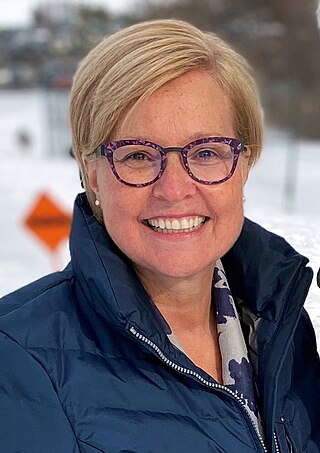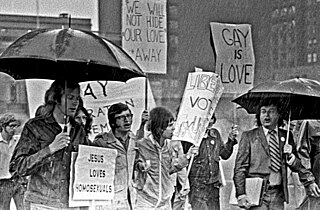Related Research Articles

Michelle D. Douglas is a Canadian human rights activist who launched a landmark legal challenge in the Federal Court of Canada against the military's discriminatory policies against LGBTQ+ service members. Douglas herself served as an officer in the Canadian Armed Forces from 1986 to 1989. She was honourably discharged from the military in 1989 under the military's discriminating "LGBT Purge".

The Body Politic was a Canadian monthly magazine, which was published from 1971 to 1987. It was one of Canada's first significant gay publications, and played a prominent role in the development of the LGBT community in Canada.

George Hislop was one of Canada's most influential gay activists. He was one of the earliest openly gay candidates for political office in Canada, and was a key figure in the early development of Toronto's gay community.

The ArQuives: Canada's LGBTQ2+ Archives, formerly known as the Canadian Lesbian and Gay Archives, is a Canadian non-profit organization, founded in 1973 as the Canadian Gay Liberation Movement Archives. The ArQuives acquires, preserves, and provides public access to material and information by and about lesbian, gay, bisexual, transgender, queer, and two-spirit communities primarily in Canada.
The Gay Alliance Toward Equality, or GATE, was one of the first Canadian gay liberation groups.
Douglas Wilson (1950–1992) was a Canadian gay activist, graduate student, publisher and writer born in Saskatchewan. In 1975, he gained prominence in a fight for gay rights with the University of Saskatchewan. The university's dean of the College of Education refused to allow Wilson into the school system to supervise practice teachers because of his public involvement with the gay liberation movement. Wilson was vice-president of the Gay Community Centre Saskatoon and had been trying to start a gay academic union at the university. The Saskatchewan Human Rights Commission failed to protect Wilson and his case was unsuccessful.
This is a timeline of notable events in the history of the lesbian, gay, bisexual and transgender (LGBT) community in Canada. For a broad overview of LGBT history in Canada see LGBT history in Canada.
David Morton Rayside is a Canadian academic and activist. He was a professor of political science at the University of Toronto until his retirement in 2013, and was the founding director of the university's Mark S. Bonham Centre for Sexual Diversity Studies from 2004 to 2008.
The Lesbian Gay Bi Trans Youth Line , founded in 1994, is a peer support organization for LGBT youth across the province of Ontario. Although originally known for their phone support line, the organization also offers online chat, SMS and e-mail support services, as well as promoting and supporting other events and programs for 2SLGBTQ+ youth.
This article gives a broad overview of lesbian, gay, bisexual and transgender (LGBT) history in Canada. LGBT activity was considered a crime from the colonial period in Canada until 1969, when Bill C-150 was passed into law. However, there is still discrimination despite anti-discrimination law. For a more detailed listing of individual incidents in Canadian LGBT history, see also Timeline of LGBT history in Canada.
Lynne Fernie is a Canadian filmmaker and interdisciplinary artist. She spent fourteen years as the Canadian Spectrum programmer for the Hot Docs Festival from 2002-2016, and was described as having a passion as "deep as her knowledge," and it was said that her "championing of Canadian documentaries and the people who make them has never wavered."
Janine Fuller is a Canadian businessperson and writer. She is the manager of Little Sister's Book and Art Emporium in Vancouver, British Columbia, and is best known for her role as an anti-censorship activist in the bookstore's ongoing battles with Canada Customs, which culminated in the Supreme Court of Canada case Little Sisters Book and Art Emporium v. Canada in 2000.
James Egan was a Canadian LGBT rights activist, best known for his role in the landmark Supreme Court of Canada case Egan v. Canada. He is considered Canada's first prominent LGBTQ activist, due to his initial period of activism from 1949 to 1964.
Gens Douglas Hellquist was a Canadian activist and publisher, noted for his prominent role in founding and developing the organized LGBT community in the province of Saskatchewan.
John Alan Lee was a Canadian writer, academic and political activist, best known as an early advocate for LGBT rights in Canada, for his academic research into sociological and psychological aspects of love and sexuality, and for his later-life advocacy of assisted suicide and the right to die.
Khush: South Asian Lesbian and Gay Association was a queer collective activist organization in Canada geared towards South Asian men and women whose goal was to promote a better understanding of South Asian culture and values within the gay and lesbian community.
Barbara Thornborrow is a former private who was involuntarily discharged from the Canadian Armed Forces for being a lesbian in 1977. She later challenged the decision, becoming the first person who was discharged based on their sexual orientation to do so publicly.
Tom Warner is an author, gay rights activist, and former Human Rights Commissioner. He was born in Saskatchewan and lives in Toronto, Ontario. He was one of the founding members of Gay Students' Alliance at the University of Saskatchewan, and of the Zodiac Friendship Society. In Toronto, he helped found the Gay Alliance Toward Equality and has been involved with the Right to Privacy Committee. From 1993 to 1996 he served as an Ontario Human Rights Commissioner.
Michael Lynch was an American-born Canadian professor, journalist, and activist, most noted as a pioneer of gay studies in Canadian academia and as an important builder of many significant LGBT rights and HIV/AIDS organizations in Toronto.

The We Demand Rally was the first large scale gay rights demonstration in Canada. The rally occurred on August 28, 1971 in Ottawa, and was organized by the gay rights activist groups Toronto Gay Action (TGA) and Community Homophile Association of Toronto (CHAT). There was a parallel rally in Vancouver that was organized in solidarity with the rally by the Vancouver group Gay Alliance Toward Equality (GATE). The rally plays an important part in the history of queer equity-seeking and gay rights in Canada, as well as the history of feminism in Canada, and has had a lasting legacy in Canadian gay rights activism.
References
- ↑ Hannon, Gerald (December 1976 – January 1977). "Marie Robertson: Upfront dyke and loving woman". The Body Politic. No. 29. p. 9.
- 1 2 "Marie Robertson". Q Hall of Fame Canada. Retrieved 10 March 2018.
- ↑ "Robertson is Ontario's First Lady of queer liberation". Xtra. 2006-04-12. Retrieved 2019-02-28.
- ↑ Slessor, Stephen. "Robertson is Ontario's First Lady of queer liberation". Daily Xtra. Retrieved 10 March 2018.
- ↑ "Marie Robertson (1952- )". The ArQuives. Retrieved 11 July 2021.
- ↑ "2013 Inductees". Q Hall of Fame Canada. Archived from the original on 10 March 2018. Retrieved 10 March 2018.